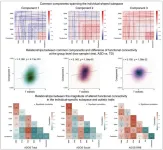(Press-News.org) BIRMINGHAM, Ala. – Researchers have discovered the novel mechanism that underlies a previously reported observation that infection by group A Streptococcus bacteria reduces the risk of later developing Type 1 diabetes.
The Journal of Immunology reports that vaccination of neonatal mice with group A Streptococcus promoted a clonal expansion of innate-like B cells that produce antibody against N-acetyl-D-glucosamine, or GlcNAc. GlcNAc is a derivative of glucose sugar that is found as part of the cell wall of group A Streptococci and as part of antigens on the insulin-producing pancreatic beta cells that are formed by GlcNAc posttranslational modifications.
The University of Alabama at Birmingham researchers showed that the associations of reduced Type 1 diabetes risk after group A Streptococcus infection was dependent on these GlcNAc-specific B-1 B cells. B-1 cells in mice are a type of B cell that produces natural antibodies, which are antibodies produced without infection. Such natural antibodies can aid in producing tolerance, the process where the immune system learns to tolerate — not attack — its own tissues.
This finding of the role for B-1 B cells “demonstrates the potential for targeting the natural antibody repertoire in considering therapeutic strategies for Type 1 diabetes,” said John Kearney, Ph.D., a professor in the UAB Department of Microbiology, who led the study.
Autoimmune diseases like Type 1 diabetes are a failure to maintain tolerance. In Type 1 diabetes, the immune system attacks and specifically destroys the insulin-producing beta cells in the pancreas. Insulin is the hormone that helps cells use glucose for energy. The loss of insulin production after death of beta cells creates damaging high levels of glucose in the blood that can lead to disabilities, including blindness, heart disease and kidney failure.
Similar to the findings of others, the UAB researchers first showed immunization of neonatal mice at 14 days of age with dead or living group A Streptococcus protected them from Type 1 diabetes, as compared to controls. In contrast, adult immunization of this mouse strain, which is prone to develop diabetes, failed to protect, so timing was central to protection.
At 10 to 12 weeks of age, the naïve mice with diabetes had significant B and T cell infiltration into the pancreas and a breakdown of the membrane around the pancreatic islets that contain beta cells. The mice that were neonatally immunized did not show those pathological changes.
The neonatally immunized mice produced immunoglobulin M, or IgM, that bound to both group A carbohydrate and GlcNAc, and the mice also showed a clonal expansion of otherwise low frequency group A carbohydrate-reactive B-1b B cell clonotypes.
The UAB researchers created group A carbohydrate-reactive monoclonal antibodies to probe possible targets of the IgM antibodies, and they found that the monoclonal antibodies recognized insulin secretory granule-associated GlcNAc antigen portions, known as epitopes, on pancreatic beta cells. These group A carbohydrate-reactive monoclonal antibodies had robust reactivity for both human and mouse pancreatic islets.
These epitopes appeared to be generated during autophagosomal degradation of mature carbohydrates, one of the steps of apoptosis, or the programmed cell death, of beta cells. Experiments showed that the GlcNAc-reactive B cell response to group A streptococci appeared to delay Type 1 diabetes, potentially by facilitating efficient clearance of apoptotic beta cells, thereby limiting activation of killer and helper T cells that ultimately would destroy healthy beta cells. Indeed, ex vivo experiments showed that binding of group A carbohydrate-reactive monoclonal antibodies to pancreatic islet cells inhibited T cell activation.
However, there was a mystery.
Administration of antibody alone, either a monoclonal antibody or pooled IgM from immunized mice, failed to protect naïve mice from developing Type 1 diabetes. Thus, while the IgM producing B cells are central to inhibiting Type 1 diabetes, and while the IgM antibody protects against T cell activation in test tube experiments with isolated cells, the IgM by itself was not able to protect naïve mice from developing Type 1 diabetes.
The answer to this mystery is that the group A carbohydrate-reactive B-1 B cells show a striking propensity to infiltrate the pancreas as Type 1 diabetes begins to develop in the mice. At 10 to 12 weeks of age, neonatal immunization had increased the numbers of activated group A carbohydrate-positive B cells uniquely localized in the pancreas by 20-fold. There, the researchers suggest, the B cells can produce IgM or other possible soluble mediators that protect the beta cells.
While IgM alone was not protective, the researchers further found that adoptive transfer of B cells from mice that were neonatally immunized with group A carbohydrate has the ability to significantly reduce the incidence of Type 1 diabetes in recipient mice at 30 weeks of age.
“Collectively, our observations indicate a significant involvement of cryptic glycan epitopes in immunological recognition of senescent beta cells, and that clonal composition of the GlcNAc-specific B cell repertoire during early life can significantly influence immune responsiveness to Type 1 diabetes autoantigens,” Kearney said. “We postulate that natural antibody repertoire defects precede emergence of beta cell-specific autoantibodies associated with and currently used to determine the risk of Type 1 diabetes progression.”
J. Stewart New is lead author of the study, “B-1 B cell–derived natural antibodies against N-Acetyl-D-Glucosamine suppress autoimmune diabetes pathogenesis,” which editors of The Journal of Immunology selected as a Top Read in the Nov. 1 issue.
Co-authors with New and Kearney are Brian L.P. Dizon and R. Glenn King, UAB Department of Microbiology; and Neil S. Greenspan, Case Western Reserve University, Cleveland, Ohio.
Support came from National Institutes of Health grants AI4782, AI120500, AI007051, DK082227 and GM008861; and Juvenile Diabetes Research Foundation grants 2-SRA-2014-300-Q-R and 17-2012-123.
At UAB, Microbiology is a department in the Marnix E. Heersink School of Medicine, and Kearney is a Distinguished Professor of Microbiology.
END
Type 1 diabetes: B cell-derived natural antibodies suppress autoimmune pathogenesis
Vaccination of neonatal mice with group A Streptococcus promotes clonal expansion of B cells that produce antibody against GlcNAc. The association of reduced Type 1 diabetes risk after group A Streptococcus infection is dependent on these GlcNAc-specific
2023-12-05
ELSE PRESS RELEASES FROM THIS DATE:
Cable-Dunlap, Chi, Smith and Thornton named ORNL Corporate Fellows
2023-12-05
Four researchers at the Department of Energy’s Oak Ridge National Laboratory have been named ORNL Corporate Fellows in recognition of significant career accomplishments and continued leadership in their scientific fields.
Corporate Fellow is the highest recognition for members of the ORNL research staff. Paula Cable-Dunlap, Miaofang Chi, Scott Smith and Peter Thornton have been recognized by the laboratory for their standing in the international scientific community as exceptional and influential researchers and as role models and mentors among peers and early career researchers.
“Paula, Miaofang, Scott and Peter represent ...
UofL secures $6.5 million to enhance training for nursing professionals
2023-12-05
The University of Louisville has received $6.5 million through two federal grants to help increase Kentuckians’ access to health care, particularly in underserved rural and urban areas. The UofL School of Nursing will use the funds from the Health Resources and Services Administration (HRSA) to develop and implement an accelerated Licensed Practical Nurse-to-Bachelor of Science in Nursing (LPN-to-BSN) pathway in medically underserved areas of Kentucky. The second HRSA-funded project aims ...
Reverse metabolomics: new method finds biomarker for inflammatory bowel disease
2023-12-05
In recent years, microbiome research has started to shift its focus from the microbes themselves to the molecules they produce. After all, it’s these molecules that directly interact with human cells to influence a person’s health. But trying to identify which molecules are being made by a person’s microbiome is quite challenging. A typical metabolomics study can only characterize about 10% of the molecular data from a human microbiome sample.
In a new study published on December 5, 2023 in Nature, microbiome experts at University of California San Diego ...
Older organs accelerate aging in transplant recipients
2023-12-05
Most organ transplantations involve supply from older donors to younger recipients. Aging cells can become senescent, a condition in which they stop multiplying and secrete chemicals that negatively affect neighboring cells. Senescent cells accumulate in older donor organs, and have the potential to compromise transplant outcomes.
A study led by researchers from Brigham and Women’s Hospital, a founding member of the Mass General Brigham healthcare system, found that in preclinical models, transplanting older organs can trigger ...
Pregnant women are missing vital nutrients needed for them and their babies – and situation could worsen with plant-based foods
2023-12-05
Pregnant women are not getting the essential nutrients they and their babies need from modern diets say scientists, who have warned that the situation will likely worsen as more people turn to plant-based foods.
A study looking at the health of expecting mothers from high-income countries, including the UK, New Zealand and Singapore, found that 90 per cent were lacking key vitamins necessary for healthy pregnancies and the wellbeing of unborn infants.
Scientists from the University of Southampton, working with experts worldwide, surveyed more than 1,700 women and found most were missing essential nutrients found in abundance in meat and dairy products.
These included vitamins B12, B6 and ...
Cell-type-specific genetic risk contributes to distinct stages of Alzheimer’s disease progression
2023-12-05
Developing treatments for Alzheimer's disease (AD) is difficult because complex underlying mechanisms drive different types of cells that may contribute to the disorder. Microglia and astrocytes, resident immune and support cells in the central nervous system, are known to exclusively express several genes linked to risk of AD — particularly AD dementia. However, it was previously unclear exactly how and when these genetic risk factors contributed to other, distinct stages of AD progression, such as the accumulation of amyloid-β plaques and tau tangles.
Researchers led by a team at Brigham and Women’s Hospital, a founding member of the Mass General Brigham healthcare ...
Argonne physicist recognized for “Top Cited Paper” by Institute of Physics
2023-12-05
A paper co-authored by physicist Filip Kondev of the U.S. Department of Energy’s (DOE) Argonne National Laboratory has earned a “Top Cited Paper Award” from IOP Publishing, the publishing arm of the Institute of Physics.
The paper, “The NUBASE2020 evaluation of nuclear physics properties,” provides researchers with recommended values of the basic nuclear physics properties for all known atomic nuclei. These data are provided for each nucleus in its ground state, its lowest energy level, and in its excited, isomeric state, a higher energy level that lives longer than what is typical. These data constitute the fundamental ...
Researchers identify altered functional brain connectivity in autism subtypes
2023-12-05
Philadelphia, December 5, 2023 – What happens in the brain to cause many neurodevelopmental disorders, including autism spectrum disorder (ASD), remains a mystery. A major limitation for researchers is the lack of biomarkers, or objective biological outputs, for these disorders, and in the case of ASD, for specific subtypes of disease. Now, a new study uses brain imaging and machine learning to identify altered functional brain connectivity (FC) in people with ASD – importantly, taking ...
Tanyu collecting instrumentation data from RAP-aggregate base project on Minnieville road
2023-12-05
Tanyu Collecting Instrumentation Data From RAP-Aggregate Base Project On Minnieville Road
Burak Tanyu, Professor, Civil, Environmental and Infrastructure Engineering (CEIE); Director of CEIE Laboratories, received $36,674 from the Virginia Department of Transportation (VDOT) for: "Collection of Instrumentation Data From the RAP-Aggregate Base Project on Minnieville Road."
Mason's Sustainable Geotransportation Infrastructure (SGI) research team has access to an actual roadway site located in Minnieville, Virginia, ...
Three decades of data in Bangladesh show elevated risk of infant mortality In flood-prone areas
2023-12-05
A new study from researchers at UC San Diego’s Scripps Institution of Oceanography and UC San Francisco estimates 152,753 excess infant deaths were attributable to living in flood-prone areas in Bangladesh over the past 30 years. Additionally, across the study period, children born during rainy months faced higher risk of death than those born in dry months.
The paper was published Dec. 5 in the Proceedings of the National Academy of Sciences and supported by the National Institute of Allergy and Infectious Diseases.
The findings begin to unspool the long term public health impacts of recurring environmental hazards such as flooding, ...
LAST 30 PRESS RELEASES:
Black soldier fly larvae show promise for safe organic waste removal
People with COPD commonly misuse medications
How periodontitis-linked bacteria accelerate osteoporosis-like bone loss through the gut
Understanding how cells take up and use isolated ‘powerhouses’ to restore energy function
Ten-point plan to deliver climate education unveiled by experts
Team led by UC San Diego researchers selected for prestigious global cancer prize
Study: Reported crop yield gains from breeding may be overstated
Stem cells from human baby teeth show promise for treating cerebral palsy
Chimps’ love for crystals could help us understand our own ancestors’ fascination with these stones
Vaginal estrogen therapy not linked to cancer recurrence in survivors of endometrial cancer
How estrogen helps protect women from high blood pressure
Breaking the efficiency barrier: Researchers propose multi-stage solar system to harness the full spectrum
A new name, a new beginning: Building a green energy future together
From algorithms to atoms: How artificial intelligence is accelerating the discovery of next-generation energy materials
Loneliness linked to fear of embarrassment: teen research
New MOH–NUS Fellowship launched to strengthen everyday ethics in Singapore’s healthcare sector
Sungkyunkwan University researchers develop next-generation transparent electrode without rare metal indium
What's going on inside quantum computers?: New method simplifies process tomography
This ancient plant-eater had a twisted jaw and sideways-facing teeth
Jackdaw chicks listen to adults to learn about predators
Toxic algal bloom has taken a heavy toll on mental health
Beyond silicon: SKKU team presents Indium Selenide roadmap for ultra-low-power AI and quantum computing
Sugar comforts newborn babies during painful procedures
Pollen exposure linked to poorer exam results taken at the end of secondary school
7 hours 18 mins may be optimal sleep length for avoiding type 2 diabetes precursor
Around 6 deaths a year linked to clubbing in the UK
Children’s development set back years by Covid lockdowns, study reveals
Four decades of data give unique insight into the Sun’s inner life
Urban trees can absorb more CO₂ than cars emit during summer
Fund for Science and Technology awards $15 million to Scripps Oceanography
[Press-News.org] Type 1 diabetes: B cell-derived natural antibodies suppress autoimmune pathogenesisVaccination of neonatal mice with group A Streptococcus promotes clonal expansion of B cells that produce antibody against GlcNAc. The association of reduced Type 1 diabetes risk after group A Streptococcus infection is dependent on these GlcNAc-specific






